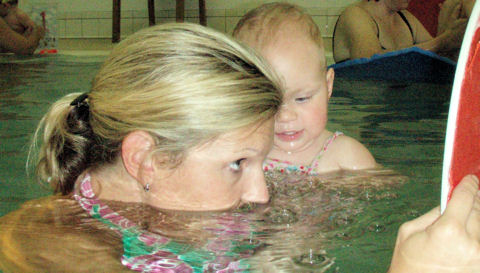
Your children are learning to swim and attend regular lessons at a nearby swim school but your family has a backyard pool. How can you make sure that your children develop good habits for swimming at home?
There are some very basic “rules” or “best practices” that everyone who swims in your backyard pool should follow:
Clean Water
Pool water can collect debris. Without the right chemicals, it can turn murky fast and make swimming in it unsafe and potentially unhealthy. Don’t swim in it if it isn’t clean and clear.
Comfortable Attire and Gear
Swimming and playing in a pool requires gear: a suit, goggles, and maybe even a cap. But there’s nothing worse than trying to have fun in the pool in a suit that is too small or goggles that won’t stay on your face. Make sure the items your child wears and us using fit and are the appropriate items for their age, swim skill level and size. It will not only help then to have fun but it is safer for them too.
Learn New Things
There are many skills and games that you may want to teach your children to do in your own pool. This is fun for them (and you) and a great way to help your children develop their critical thinking skills. Keep these learning times safe by practicing good habits around the swimming pool – even when playing games – and always follow water safety rules.
Practice Skills
Your backyard pool is the perfect place for your children to practice the skills they’ve learned at swimming lessons, but make sure that they are supervised and have the help they need to do this. Reinforce the importance of repetition in learning their skills. Your kids will be ultra-prepared for their next lesson.
Safe Pace
Don’t let children go too far in trying to do swim skills that they see older children doing. Learning to swim is a gradual process. They need to take it one step at a time.
Swim Partner
Regardless of your age or swim skill level, never swim alone. It’s more fun when you have two or more anyway, so find a buddy to join you before your start your swim.
Water Depth
Swimmers should stay in water that is a comfortable depth for each individual. If children are playing games make sure that the depth they are playing in is comfortable for the youngest or least experienced swimmer among them – not the oldest and most skilled. Often children try to be brave and daring about this when they are playing with older kids.
Have Fun
Make sure to end on a positive note so that your children will enjoy swimming in the backyard pool. Don’t let the fun afternoon turn into an afternoon of swim drills. Swimming is fun so make sure it does not turn into something your children dread.
Establishing and enforcing rules for your pool are important. People of all ages drown daily in backyard pools because they don’t follow safety best practices. Just among children 14 years of age and younger, an estimated 5,000 children are hospitalized due to near-drownings each year. 15% die in the hospital and as many as 20% suffer severe, permanent neurological disability. (Foundation for Aquatic Injury Prevention). It only takes a second for something frightening or fatal to happen. And that’s not worth the risk of simply being too lazy to enforce safety around your pool.


Comments